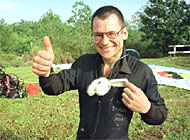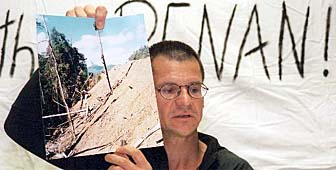Vanishing into thin air

Every year, dozens of Swiss citizens are reported missing while abroad. Most are located quickly but some are never seen again.
The most publicised case is that of Bruno Manser, a civil rights activist working with an indigenous group of Malays. There has been no news of him for four years.
Another is François Mayer, the Swiss delegate of the Red Cross in Pretoria. He disappeared in December 2001, and all efforts to trace him have turned up nothing.
According to the foreign ministry, 62 people were reported missing in 2003. And a further 15 vanished in the first seven months of this year.
“Most cases are solved very quickly,” says foreign ministry spokeswoman Carine Carey.
A fair number are reported missing simply because they have been out of touch for a few days.
The ministry usually receives a word that someone is missing from the person’s family. Its officials first analyse the situation, and then make contact with the authorities of the country concerned.
“Swiss diplomatic representations abroad seek assistance from the local authorities and help family members in the preliminary search procedures,” explains Carey.
Helpful
International cooperation is the key factor in conducting a search, though not all countries are equally helpful.
“In some countries, police efforts are minimal,” says Christian Sidéris, director of the Geneva-based CS Enquêtes detective agency.
Sidéris cites an investigation carried out in India: “The police officers merely posted a missing person announcement, surrounded by hundreds of other notices.”
If preliminary investigations prove fruitless, the foreign ministry advises family members to notify the authorities of the canton in which the missing person was resident.
The ministry is not authorised to issue missing person notices in Switzerland.
Carine Carey is quick to point out that the ministry’s “role is limited to giving advice; it is the responsibility of the family to undertake further investigations”.
Detectives
Relatives or friends often turn to professionals. “Private detectives are more effective than the police,” points out Sidéris, “because they can concentrate on one case at a time.”
Sidéris says missing persons do not all fit into the same category. “Some people we are asked to trace are seriously in debt, some are holiday-makers, while others have moved abroad after meeting the great love of their lives.”
Sidéris notes, however, that not everyone who disappears is a passive victim of events. “Many do a bunk simply because they want to. Everyone is free to disappear, so long as they have no financial or contractual obligations towards third parties.”
Pressure
Carey adds that, throughout the investigative process, the Swiss government maintains contact with and, if necessary, puts pressure on the authorities in other countries.
In addition to Swiss diplomatic representatives abroad, the Federal Office of Police, Interpol and the Red Cross may also provide assistance.
In the case of the Geneva-based detective agency, which boasts a success rate of 80 per cent, the average investigation lasts between ten and 15 days.
But the cost of finding someone abroad varies. “The price depends on the country in which the investigation takes place, and on how much information we have to go on. It can range from a few thousand francs to a maximum of SFr80,000,” explains Sidéris.
For people wanting to disappear without any risk of being traced, Sidéris says the Middle East is the best bet because it is very inhospitable to private investigators.
No-go area
“The United Arab Emirates and neighbouring countries are a no-go area for us. Detective work is not allowed and the legislation banning it is strictly enforced.”
Possibly the best-known case of a Swiss citizen who disappeared is that of Bruno Manser. The Basel-born ecologist had spent six years – from 1984 to 1990 – living with the Penan people of Sarawak, a Malaysian enclave in Borneo.
His 16 “Rain Forest Journals”, published at the end of July, are an illustrated account of his experiences in the jungle.
Supporting the local people in a non-violent struggle to protect the tropical forest, Manser had become an embarrassment to the Malaysian authorities and logging companies. He was last heard of in May 2000.
Since then two expeditions to find him, organised by his brother, have come to nothing.
Blood
It’s a similar situation with François Mayer, a doctor from Lausanne. His car was found abandoned in a poor area on the outskirts of Johannesburg with traces of blood on one of the seats.
The original number plates had been replaced with fakes.
Two and a half years later, his whereabouts remain a complete mystery. Was he murdered or abducted? Or did he stage his own disappearance?
swissinfo, Luigi Jorio
Last year, the Swiss authorities received reports of 62 people missing while abroad.
A further 15 went missing in the first seven months of this year.
The most widely publicised cases are those of an environmental activist who went missing in Borneo, and a Swiss doctor, who disappeared in South Africa.
Roughly 90% of those who go missing reappear within a few days or weeks.
Most of them are young people running away, adults having an affair, or tourists who have failed to stay in touch.
The remaining 10% are never traced.

In compliance with the JTI standards
More: SWI swissinfo.ch certified by the Journalism Trust Initiative




You can find an overview of ongoing debates with our journalists here . Please join us!
If you want to start a conversation about a topic raised in this article or want to report factual errors, email us at english@swissinfo.ch.